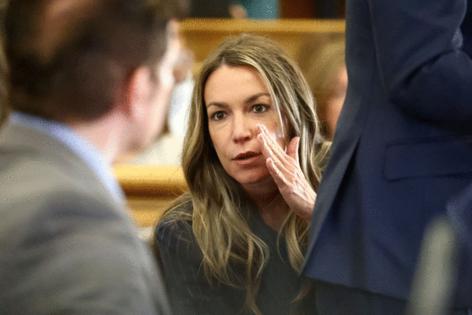Karen Read murder retrial: First day of jury selection underway
Published in News & Features
DEDHAM, Mass. — The Karen Read retrial officially got underway Tuesday in Norfolk Superior Court with the start of jury selection.
The Read trial has been anything but quiet since Judge Beverly J. Cannone declared a mistrial last summer.
Court Clerk James McDermott opened court Monday at 9:28 a.m., after which Cannone immediately entered sidebar with the attorneys. The first set of potential jurors were brought in at 9:32 a.m.
Of the roughly 90 candidates in the first group, nearly 80 of them raised their hand to indicate they had at least heard of the case, about 40 indicated they had already formed an opinion on the case, and nearly half of those agreed they had formed a “bias.”
“We appreciate that you are here, ready and willing to serve,” Cannone told the jurors before briefly describing the case they may help decide. “Our system of justice simply does not work without you. Thank you.”
Read, 45, is accused of striking John O’Keefe, her boyfriend of two years and a 16-year Boston police officer, with her car and leaving him to die in a major snowstorm on the front lawn of 34 Fairview Road in Canton on Jan. 29, 2022.
On Monday, there was no shortage of further filing activity, including that of the approved jury questionnaire; that the defense may raise the idea — a “third-party culprit defense” — that two other men, Brian Albert and Brian Higgins, killed O’Keefe, in the same capacity of the last trial; and that the juror list be impounded ahead of the trial for their “safety.”
Cannone read the “lengthy list” of witnesses in the case to the first round of potential jurors.
“As you can imagine, folks, this case could take a while,” she told them, saying that the trial could take up to eight weeks, at a high estimate.
Jury concerns
The Massachusetts trial court will call 275 potential jurors each day of this first week in an effort to find a jury for trial, a spokeswoman said. That number will decrease to the still-massive 243 called per day on the following days — or weeks — until an impartial jury from Norfolk County, which is saturated in Read coverage.
The challenge of seating an impartial jury was further illuminated by another Monday motion which got significantly less media attention: the prosecution’s request for Cannone to lay out the “parameters of jury empanelment.”
The motion, in less than a page, requests that Cannone set guidelines for examining both the criminal records and internet and social media searches for potential jurors before they are sworn in.
“The Court previously allowed the Commonwealth’s motion to check the criminal histories of all sixteen prospective jurors, to determine whether they are qualified to serve before the jury is sworn,” the motion states.
“In the principles of fairness and equity, the Commonwealth inquires of what ground rules or restrictions are in place regarding either party from conducting extraneous inquiries into the qualifications of a potential juror, including internet or social media searches,” the motion continues. “The Commonwealth moves for clear ground rules and boundaries and asks this Honorable Court to advise both parties.”
The motion stood out to retired Superior Court Judge Jack Lu, who told the Boston Herald that most people don’t understand the restrictions in place for accessing criminal record information: “Accessing criminal records is electronically logged, and people have been criminally prosecuted for unauthorized access, even police officers searching criminal records for improper reasons.”
“The more interesting part of the motion is requesting guidelines for internet and social media searches,” Lu, who teaches legal subjects at a number of area colleges and universities including UMass Lowell, Boston College, and New England Law.
“This seems a bit more challenging to regulate because Google searches and social media are open to all,” he continued in an email. “It may be that ground rules are appropriate explicitly forbidding communications with potential jurors via social media but it is hard to see how examination of Google results and social media profiles and posts can be forbidden.”
Cannone stressed to the first round of potential jurors that no matter how loud or persistent outside voices — whether the media, social media or physical protesters outside — this case is to be decided “based only upon the evidence in this courtroom and the law … it is just that simple and that important.”
“While public comment will likely continue, the rule of law will be upheld,” she said.
----------
©2025 MediaNews Group, Inc. Visit at bostonherald.com. Distributed by Tribune Content Agency, LLC.







Comments